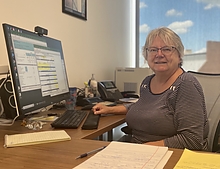Zapf Keeps the Money Moving at UMIACS

With her cheerful disposition and warm smile, Petra Zapf is usually the first person to arrive and greet staff and faculty every morning at the University of Maryland Institute for Advanced Computer Studies (UMIACS).
“I’ve always been an early riser,” she says. "It allows me to get an early jump on everything I need to do for the day."
As the director of finance, Zapf is vital to the operations at UMIACS—a multidisciplinary institute that uses innovative computing techniques and infrastructure to address pressing scientific and societal challenges in national defense, precision medicine, big data, cybersecurity, language, and more.
It’s Zapf’s job to assist with the administrative and compliance side of research proposals for the millions of dollars in funding that supports this research, so faculty can concentrate on the technical aspects. Upon receipt of funding, she assists faculty in monitoring, managing, and reporting for their funding. Her other responsibilities include approving purchasing and travel, organizing record-retention, and monitoring payroll changes.
UMIACS faculty bring in about $25 million in research funding annually, all of which crosses Zapf’s desk. The money comes from federal organizations like the National Science Foundation, National Institutes of Health, and National Institute of Standards and Technology; as well as state initiatives, private donors, and companies like Capital One.
Emily Hartz, the executive director of administration and operations for UMIACS and Zapf’s supervisor, says she is “spectacular” at what she does because she truly cares about UMIACS’ mission and making sure that its funding is used as effectively as possible.
“She also cares about creating a positive, useful experience, and is always trying to find ways to take the administrative burden off our researchers, so they can simply focus on their research,” says Hartz. “Petra is the essence of what we try to accomplish here in UMIACS and I am incredibly grateful for her expertise, kindness, team-oriented attitude, drive and incredible ability to consistently perform at an exceptionally high level.”
Several faculty members have echoed Hartz's praise of Zapf.
"I would never have figured out how to write my first grant application—let alone manage to get every application since then out the door—without the amazing work done by Petra," says Michelle Mazurek, an associate professor of computer science and director of the Maryland Cybersecurity Center.
Hal Daumé III, a professor of computer science, says: "I’ve worked with Petra for more than a decade and she’s always extremely available, helpful and insightful. None of what I do would be possible without her."
Zapf is a proud UMD alumna, having earned both an undergraduate degree in accounting and a master’s degree in Germanic studies in 1994 and 1998. As a graduate student, she worked in the university’s Office of Research Administration (ORA), and then went on to the Financial Office for Grant Administration (now the Division of Research’s Sponsored Programs Accounting and Compliance) after graduation. There she found her calling, went back to ORA for five years before deciding to work at the department level of research administration.
Now she has been at UMIACS for 17 years, describing it as a wonderful place to work.
“I enjoy helping faculty and I really like the variety of my work, its constant challenges, and, of course, the people at UMIACS make it an enjoyable place to be.”
—Story by Melissa Brachfeld
